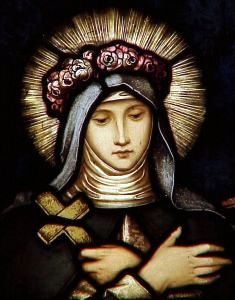HOMILY WEEK 21 01 – Year I
Living Faith:
Optional Memorial of St. Rose of Lima
(1 Thes 1:1-10; Ps 149; Mt 23:13-22)
***************************************
The problem of addicts is not that they think they are worms, nor that they think they are special. Their problem is that they think they are very special worms! This cute saying actually fits in with today’s liturgy.
Usually, liturgists aim for some connection between the gospel and the first reading. Today’s readings, however, are linked more by their contrast to one another than by any connection.
They both end up with the same message, however, like two sides of a coin: to put our faith in the God of Jesus Christ, to let go of any idolatry or addiction in our lives, and to lead lives of expectant hope.
In the first reading, Paul’s words to one of his favourite communities, the Thessalonians, gives us the positive side of the message. He praises them for their faith in the one true God, for turning away from all the idol worship that surrounded them and for their expectant, hopeful waiting for the second coming of the risen Lord, Jesus Christ.
We see the flip side of this in the Gospel, where Jesus upbraids and chastises the scribes and Pharisees for their unbelief, their hypocrisy and for turning their faith into a self-serving religion that actually prevents others from a genuine life of faith in God.
The message is clear – on the one hand, we are to avoid the unbelief, the hypocrisy and the deceptive, addictive religiosity of the scribes and Pharisees, and on the other hand, we are to emulate the Thessalonians in their genuine faith, their conversion of heart, and their living hope in the coming of Christ.
Like the Thessalonians, our belief must also be a “work of faith in God the Father and the Lord Jesus and a labour of love and steadfastness of hope in our Lord Jesus Christ.”
Like them, we must also practice the spirituality of letting go, of turning away from any idols or false gods in our lives. Those idols will be for us the same ones that faced the Israelites in the desert, the same ones that the scribes and Pharisees succumbed to centuries later: possessions and pleasure, prestige and fame, power and control. The Big Book of Alcoholics Anonymous puts it more simply: we are to turn away from abusing and becoming addicted to money, fame and power. These are the false gods that surround us on every side, tempt us, control us, addict us and even destroy us.
Like the Thessalonians, we are to wait for the Son of God from heaven, whom the Father raised from the dead. In his book Knowing Jesus, James Alison O.P. highlights three essential characteristics of the resurrection of Jesus – gratuitousness, forgiveness and mission. He stresses that Jesus is not just “one risen from the dead,” but the “crucified-risen-one” who as such reveals the whole meaning of the Old Testament prophecies.
Finally, like the Thessalonians, we are to wait for Jesus to come again, to keep vigil. To keep vigil is to wait for some event or someone to come into our lives to bring wholeness, completion, fullness. That will happen in the Parousia, when Jesus comes again to bring all things to their completion.

St Rose of Lima
The church today offers us an example of someone who lived this gospel fully – St. Rose of Lima. Rose was born in Peru in 1586 and died on August 15, 1617. While still a young girl, she embraced a selfless life of prayer, devotion and penance which she practiced to an extreme, subjecting her body to austerities as well as deprivation of food and sleep. Rose was confirmed in 1597 by the Archbishop of Lima, Toribio de Mogrovejo, who was also to be declared a saint. She refused to marry and became a Dominican tertiary at the age of 20. Rose lived in a small hut in her parents’ garden, working to help support them, and also cared for the sick, the poor, the Indigenous and slaves. Her asceticism and her intense spiritual experiences (periods of darkness and desolation as well as mystical experiences) aroused some criticism from her family and friends and the suspicion of Church authorities. Nevertheless, in 1671, she became the first person in the Americas to be canonized and is patron saint of South America.
The Eucharist is one of the best ways for us to “keep vigil.” We say or sing after the consecration, “We proclaim your death, O Lord, and profess your resurrection, until you come again.”
May our celebration help us to imitate and emulate both the Thessalonians and St. Augustine in their faith, their turning away from idols, and their lives of expectant hope in Jesus Christ, the crucified-risen-one.



